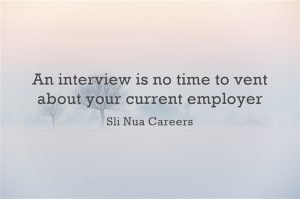 Just because you know you’re great doesn’t mean you’re home and dry. You’ve got to convince the interview panel too, writes Arthur Geraghty, Career Coach at Sli Nua Careers.
Just because you know you’re great doesn’t mean you’re home and dry. You’ve got to convince the interview panel too, writes Arthur Geraghty, Career Coach at Sli Nua Careers.
Interviews are not a perfect way of selecting candidates – and, indeed, many employers deploy a variety of other selection tool to complement interviews – but they are still the most common method. Here are five common mistakes to avoid if you want to keep yourself in the frame.
1. Failing to research the company
Critical errors are often made before you even get to the interview panel. This includes the failure to make the effort to study the company’s products/services, values, competitors and recent activities. Nowadays, company information is readily available. Potential employers will expect that all candidates will have a strong grasp of the company profile. Set yourself apart from the competition by sourcing concrete information that will communicate that you are interested in the company, the role and the industry.
 2. Neglecting the opportunity to ask a question
2. Neglecting the opportunity to ask a question
The ‘any questions’ section of the interview can be pivotal in differentiating the outstanding candidate from the chasing pack. Disregarding this opportunity as a formality will likely influence the decision makers to believe you’re not interested in the role. Your goal should be to direct the interview to a zone where it becomes a knowledgeable conversation. The candidate who asks generic questions will appear less prepared and enthusiastic than those who’ve taken the time to prepare a question relevant to the specific role.
3. Complaining about your current employer
An interview is no time to vent about your current employer, your boss or your job. Keep in mind that you’re seeking to paint a positive picture of what it’s like to work with you and how you represent a company. No employer wants to get the impression that you’re looking to join just to move on from a bad situation. Most roles require a positive attitude and a degree of flexibility, so it’s essential you communicate this to the interview panel.
4. Giving a sloppy account of yourself
Arriving late, dressed in inappropriate attire, offering a weak handshake, or bringing your coffee in to the interview are all textbook examples of what will stack the odds against you. You’ll find that you’ve to play catch-up before the first question has been asked. Throughout the interview, the panel are likely to subconsciously revert to this unprofessional image when there are any imperfections in your answer, whereas those who conduct themselves professionally will often receive the benefit of the doubt.
5. Scripted answers
It’s okay to have thought through some answers fairly extensively – the ‘tell us about yourself’ one at the outset, for example – but do not develop a dependency on scripted answers. Don’t learn them off. The interview panel would rather you take the time to think about your answer and deliver a measured response. Focus on the content of your delivery and don’t berate yourself for the ‘uhm-ing and ahh-ing’ – these inevitably happen when you aren’t reading from a script. You will give a much better account of yourself by taking your time to describe the finer details of how you can do the job.
Arthur Geraghty is a Career Coach with Sli Nua Careers.
Make a booking HERE for CV Preparation, Application Form writing, Interview Training and Mock Interviews.